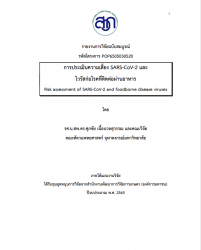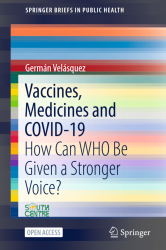
Author : Velásquez, Germán
Publishing Date : Mar 22, 2023
This open access book is a collection of research papers on COVID-19 by Germán Velásquez from 2020 and early 2021 that help to answer the question: How can an agency like the World Health Organization (WHO) be given a stronger voice to exercise authority and leadership? The considerable health, economic and social challenges that the world faced at the beginning of 2020 with COVID-19 continued and worsened in many parts of the world in the second-half of 2020 and into 2021. Many of these countries and nations wanted to explore COVID-19 on their own, sometimes without listening to the main international health bodies such as WHO, an agency of the United Nations system with long-standing experience and vast knowledge at the global level and of which all countries in the world are members. In this single volume, the chapters present the progress of thinking and debate — particularly in relation to drugs and vaccines — that would enable a response to the COVID-19 pandemic or to subsequent crises that may arise. Among the topics covered: COVID-19 Vaccines: Between Ethics, Health and Economics Medicines and Intellectual Property: 10 Years of the WHO Global Strategy Re-thinking Global and Local Manufacturing of Medical Products After COVID-19 Rethinking R&D for Pharmaceutical Products After the Novel Coronavirus COVID-19 Shock Intellectual Property and Access to Medicines and Vaccines The World Health Organization Reforms in the Time of COVID-19 Vaccines, Medicines and COVID-19: How Can WHO Be Given a Stronger Voice? is essential reading for negotiators from the 194 member countries of the World Health Organization (WHO); World Trade Organization (WTO) and World Intellectual Property Organization (WIPO) staff participating in these negotiations; academics and students of public health, medicine, health sciences, law, sociology and political science; and intergovernmental organizations and non-governmental organizations that follow the issue of access to treatments and vaccines for COVID-19.
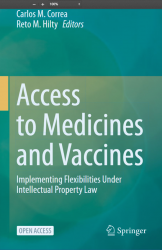
Author : Correa, Carlos M., Hilty, Reto M.
Publishing Date : Mar 20, 2023
This open access book is the outcome of a Global Forum on Innovation, Intellectual Property and Access to Medicines held in December 2019 at the Max Plank Instititute in Munich, organised by the South Centre and the Max Plank Institute. The academics and experts from international organisations participating have contributed chapters to this book. The book is for policy makers (in Ministries of Health, Ministries of Trade, Ministries of Foreign Affairs, patent offices), but also relevant for academics (law, trade, public health), on the flexibilities available in the Agreement on Trade Related Aspects of Intellectual Property Rights (TRIPS) of the World Trade Organization to promote access to medicines.
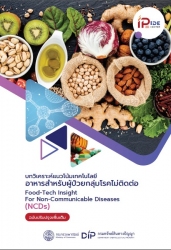
Author : ทรัพย์สินทางปัญญา, กรม
Publishing Date : Jan 05, 2022
รายงานวิเคราะห์แนวโน้มเทคโนโลยีฉบับนี้ มีวัตถุประสงค์เพื่อนำเสนอแนวโน้มเทคโนโลยีที่เกี่ยวข้องกับอาหารสำาหรับผู้ป่วยในปัจจุบัน โดย
อ้างอิงตามบทวิเคราะห์แนวโน้ม “เทคโนโลยี" อาหารสำาหรับผู้ป่วยกลุ่มโรคไม่ติดต่อ” ที่ได้จัดทำขึ้นในปี พ.ศ. 2561
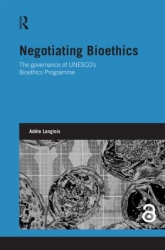
Author : Adèle Langlois
Publishing Date : Aug 15, 2013
The sequencing of the entire human genome has opened up unprecedented possibilities for healthcare, but also ethical and social dilemmas about how these can be achieved, particularly in developing countries. UNESCO’s Bioethics Programme was established to address such issues in 1993. Since then, it has adopted three declarations on human genetics and bioethics (1997, 2003 and 2005), set up numerous training programmes around the world and debated the need for an international convention on human reproductive cloning.
Negotiating Bioethics presents Langlois' research on the negotiation and implementation of the three declarations and the human cloning debate, based on fieldwork carried out in Kenya, South Africa, France and the UK, among policy-makers, geneticists, ethicists, civil society representatives and industry professionals. The book examines whether the UNESCO Bioethics Programme is an effective forum for (a) decision-making on bioethics issues and (b) ensuring ethical practice. Considering two different aspects of the UNESCO Bioethics Programme – deliberation and implementation – at international and national levels, Langlois explores:
how relations between developed and developing countries can be made more equal
who should be involved in global level decision-making and how this should proceed
how overlap between initiatives can be avoided
what can be done to improve the implementation of international norms by sovereign states
how far universal norms can be contextualized
what impact the efficacy of national level governance has at international level
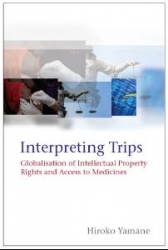
Author : Hiroko Yamane
Publishing Date : Sep 29, 2014
Protection of intellectual property rights (IPRs) has become a global issue. The Trade-Related Aspects of Intellectual Property (TRIPS) Agreement outlines the minimum standards for IPR protection for WTO members and offers a global regime for IPR protection. However, the benefits of TRIPS are more questionable in poorer countries where national infrastructure for research and development (R & D) and social protection are inadequate, whereas the cost of innovation is high. Today, after more than a decade of intense debate over global IPR protection, the problems remain acute, although there is also evidence of progress and cooperation.
This book examines various views of the role of IPRs as incentives for innovation against the backdrop of development and the transfer of technology between globalised, knowledge-based, high technology economies. The book retraces the origins, content and interpretations of the TRIPS Agreement, including its interpretations by WTO dispute settlement organs. It also analyses sources of controversy over IPRs, examining pharmaceutical industry strategies of emerging countries with different IPR policies.
The continuing international debate over IPRs is examined in depth, as are TRIPS rules and the controversy about implementing the ‘flexibilities’ of the Agreement in the light of national policy objectives. The author concludes that for governments in developing countries, as well as for their business and scientific communities, a great deal depends on domestic policy objectives and their implementation. IPR protection should be supporting domestic policies for innovation and investment. This, in turn requires a re-casting of the debate about TRIPS, to place cooperation in global and efficient R & D at the heart of concerns over IPR protection.
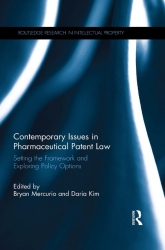
Author : Bryan Mercurio, Daria Kim
Publishing Date : Feb 17, 2017
This collection reflects on contemporary and contentious issues in international rulemaking in regards to pharmaceutical patent law. With chapters from both well-established and rising scholars, the collection contributes to the understanding of the regulatory framework governing pharmaceutical patents as an integrated discipline through the assessment of relevant laws, trends and policy options. Focusing on patent law and related pharmaceutical regulations, the collection addresses the pressing issues governments face in an attempt to resolve policy dilemmas involving competing interests, needs and objectives. The common theme running throughout the collection is the need for policy and law makers to think and act in a systemic manner and to be more reflective and responsive in finding new solutions within and outside the patent system to the long-standing problems as well as emerging challenges
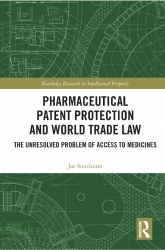
Author : Jae Sundaram
Publishing Date : May 08, 2018
Patents, including pharmaceutical patents, enjoy extended protection for twenty years under the TRIPs Agreement. The Agreement has resulted in creating a two-tier system of the World Trade Organisation Member States, and its implementation has seen the price of pharmaceutical products skyrocket, putting essential medicines beyond the reach of the common man. The hardest hit populations come from the developing and least developed countries, which have either a weak healthcare system or no healthcare at all, where access to essential and affordable medicines is extremely difficult to achieve.
Pharmaceutical Patent Protection and World Trade Law studies the problems faced by these countries in obtaining access to affordable medicines for their citizens in light of the TRIPS Agreement. It explores the opportunities that are still open for some developing countries to utilise the flexibilities available under the TRIPS Agreement in order to mitigate the damage caused by it. The book also examines the interrelationship between the world governing bodies, and the right to health contained in some of the developing country’s national constitutions.
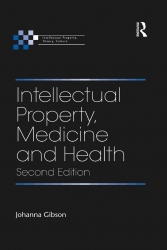
Author : Johanna Gibson
Publishing Date : Nov 23, 2017
Intellectual Property, Medicine and Health examines critical issues and debates, including access to knowledge and medicinal products, human rights and development, innovations in life technologies and the possibility for ethical frameworks for intellectual property law and its application in public health.
The second edition accounts for recent and in some areas extensive developments in this dynamic and fast-moving field. This edition brings together new and updated examples and analysis in competition and regulation, gene-related inventions and biotechnology, as well as significant cases, including Novartis v Union of India.
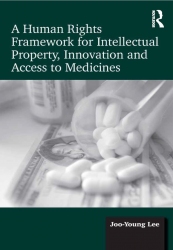
Author : Joo-Young Lee
Publishing Date : Mar 09, 2016
This book examines the relationship between intellectual property in pharmaceuticals and access to medicines from a human rights perspective, with a view to contributing to the development of a human rights framework that can guide States in enacting and implementing intellectual property law and policy. The study primarily explores whether conflicts between patents and human rights in the context of access to medicines are inevitable, or whether patents can be made to serve human rights. What could be a normative framework that human rights might provide for patents and innovation? Joo-Young Lee argues that it is necessary to have a deepened understanding of each of the two sets of norms that govern this issue, that is, patent law and international human rights law. The chapters investigate the relevant dimensions of patent law, and analyse particular human rights bearing upon the issue of intellectual property and access to medicines. This study will be of great interest to academic specialists, practitioners or professionals in the fields of human rights, trade, and intellectual property, as well as policy makers, activists, and health professionals across the world working in intellectual property and human rights.
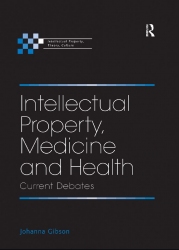
Author : Johanna Gibson
Publishing Date : Nov 23, 2017
Intellectual Property, Medicine and Health examines critical issues and debates, including access to knowledge and medicinal products, human rights and development, innovations in life technologies and the possibility for ethical frameworks for intellectual property law and its application in public health.
The second edition accounts for recent and in some areas extensive developments in this dynamic and fast-moving field. This edition brings together new and updated examples and analysis in competition and regulation, gene-related inventions and biotechnology, as well as significant cases, including Novartis v Union of India.
12NextLast

